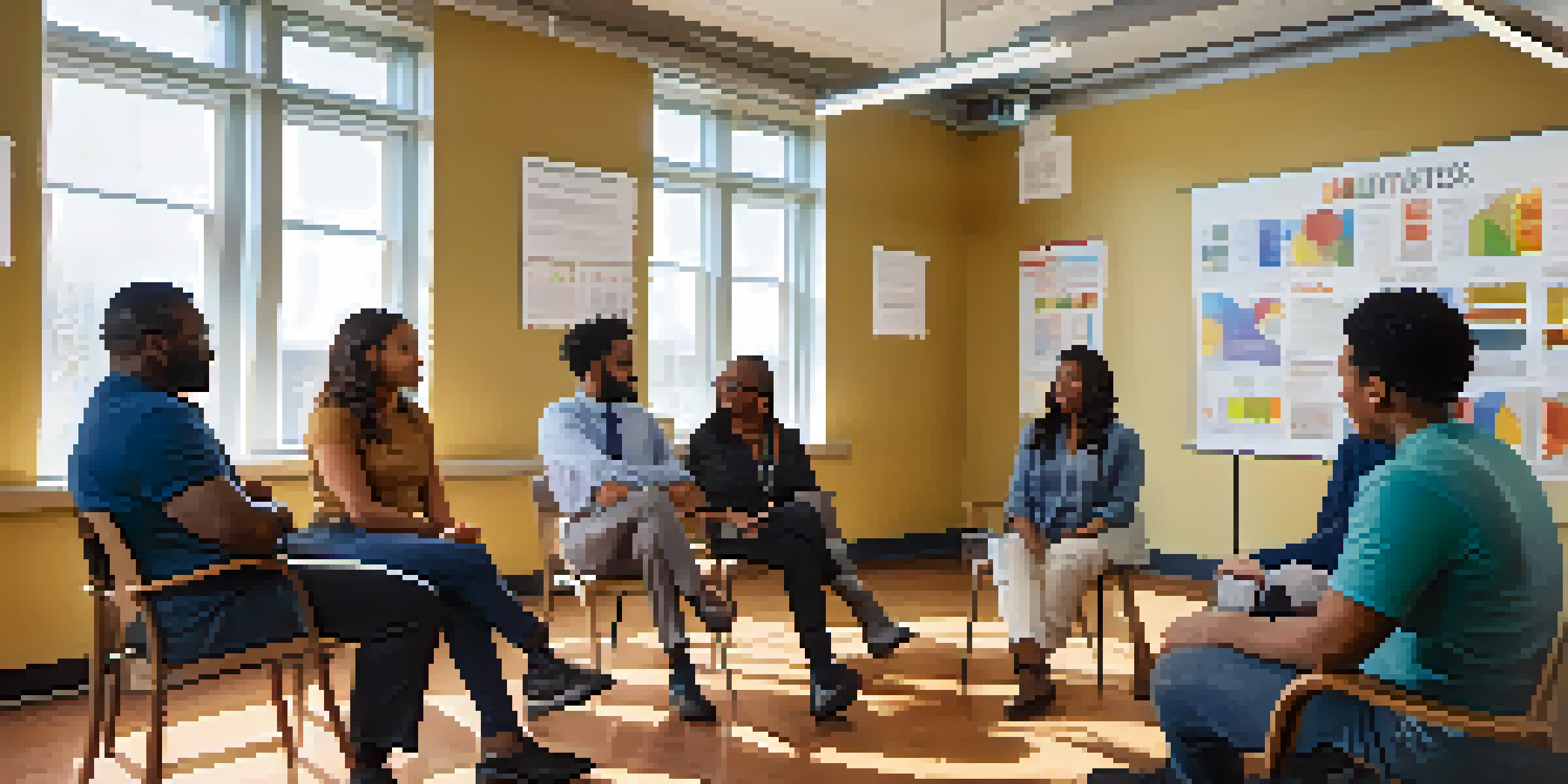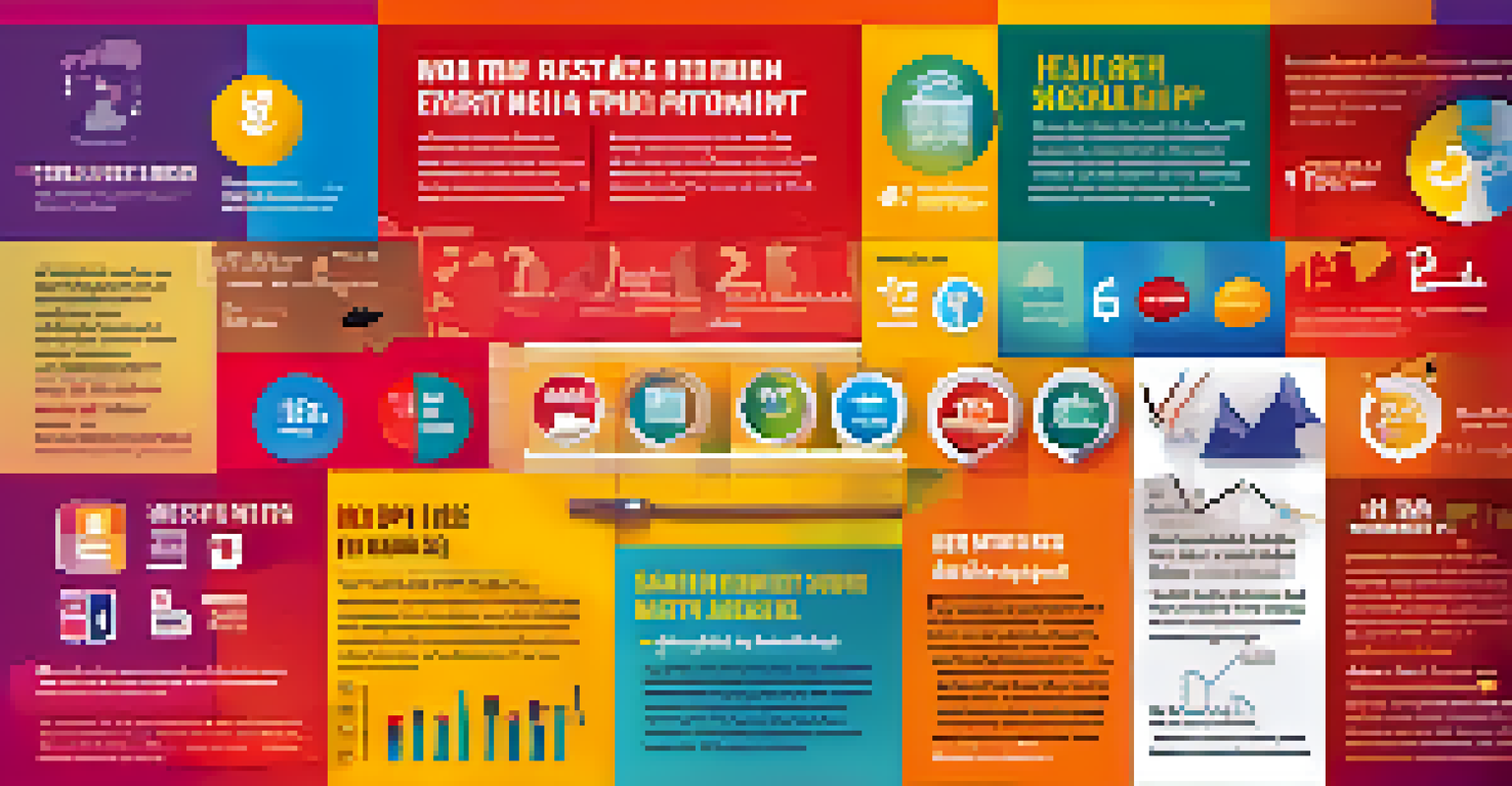The Role of Media in Shaping Health Equity Awareness

Defining Health Equity and Its Importance
Health equity refers to the principle of ensuring that everyone has a fair and just opportunity to be as healthy as possible. This concept emphasizes that social determinants like race, income, and location can significantly impact health outcomes. When we talk about health equity, we’re advocating for systemic changes that address these disparities.
Health is a human right, not a privilege to be purchased.
Understanding health equity is crucial because it highlights the disparities that exist in our healthcare systems. For instance, marginalized communities may face barriers to accessing quality care, leading to worse health outcomes. By raising awareness about these issues, we can foster a more inclusive approach to public health.
Ultimately, health equity is about empowering individuals and communities to seek the care they need. It encourages a societal shift towards recognizing the importance of equal access to health resources, which can lead to healthier populations overall.
The Power of Media in Shaping Public Perception
Media plays a pivotal role in how we perceive health issues and disparities. Through news stories, social media, and documentaries, the media can highlight the struggles faced by underrepresented communities. This visibility is essential for fostering empathy and understanding among the general public.

For example, when a news outlet covers a story about a community facing high rates of diabetes due to lack of access to healthy food, it can spark conversations about health equity. This kind of coverage not only informs the audience but also pressures policymakers to take action. The media serves as a bridge between the public and the issues that need attention.
Health Equity Empowers Communities
Health equity advocates for fair access to healthcare, ensuring marginalized communities can achieve better health outcomes.
Moreover, the influence of social media cannot be understated. Campaigns that go viral can mobilize support and ignite discussions about health disparities, empowering communities to advocate for their health needs. In this way, media can be a powerful ally in the fight for health equity.
Challenges Faced by Health Equity Advocacy
Despite the potential of media to promote health equity, there are notable challenges that activists and advocates face. Misinformation can easily spread through social platforms, leading to confusion about health issues. This can undermine efforts to promote accurate information and equitable health practices.
The greatest weapon against stress is our ability to choose one thought over another.
Additionally, not all media representations are fair or accurate. Sometimes, stories may oversimplify complex health issues or perpetuate stereotypes about certain communities. This can detract from the nuances of health equity and discourage meaningful discussions.
Advocates must navigate these challenges to ensure that their message is clear and impactful. This includes collaborating with journalists and media organizations to provide accurate data and compelling narratives that truly represent the communities they aim to serve.
Role of Social Media in Health Equity Awareness
Social media platforms have emerged as vital tools for raising awareness about health equity. They allow individuals and organizations to share personal stories, data, and resources that highlight health disparities. This grassroots approach can help build a community of advocates who are passionate about change.
For instance, campaigns like #BlackLivesMatter have expanded beyond racial justice to include discussions about health equity, showcasing how systemic racism affects health outcomes. These online movements create a space for dialogue and can lead to real-world actions that address these critical issues.
Media Shapes Health Perceptions
The media plays a crucial role in raising awareness about health disparities, helping to foster empathy and motivate action.
Moreover, social media facilitates direct communication between advocates and the public, allowing for instant feedback and engagement. This interactivity can amplify the voices of those most affected by health disparities, creating a more inclusive narrative around health equity.
Media Literacy as a Tool for Empowerment
Media literacy is an essential skill in today’s information-rich environment. It empowers individuals to critically evaluate the information they consume and understand the nuances of health-related news. By fostering media literacy, we can help people discern fact from fiction, particularly regarding health equity.
For example, educational programs that teach media literacy can enable communities to better understand health data and recognize biased reporting. This understanding can lead to more informed discussions and advocacy efforts, as individuals are equipped to challenge misinformation.
Ultimately, enhancing media literacy contributes to a more informed public that can engage effectively in conversations about health equity. This empowerment is crucial for building a society that prioritizes equitable health outcomes for all.
Successful Campaigns Highlighting Health Equity
Several successful media campaigns have effectively raised awareness about health equity issues. For example, the 'Healthy People' initiative uses media to communicate national health objectives and promote healthy living across communities. Such campaigns often employ relatable storytelling to resonate with diverse audiences.
Another impactful campaign is 'This Is Our Shot,' which aimed to increase COVID-19 vaccinations in underserved communities. By using targeted messaging and authentic voices from those communities, the campaign successfully addressed vaccine hesitancy and promoted health equity.
Media Literacy Enhances Advocacy
Fostering media literacy equips individuals to critically evaluate health information, empowering them to advocate for health equity.
These examples demonstrate that when media campaigns are thoughtfully designed and culturally relevant, they can significantly influence public perception and drive action towards achieving health equity.
The Future of Media and Health Equity
Looking ahead, the relationship between media and health equity will continue to evolve. As technology advances, new platforms and tools will emerge, providing fresh opportunities for advocacy and awareness. It’s essential for health equity advocates to stay adaptable and innovative in their approach.
Moreover, collaborations between media outlets and health organizations will be crucial in amplifying voices that have historically been marginalized. By working together, these entities can create content that not only informs but also inspires action and change.

Ultimately, the future of health equity awareness will depend on our collective ability to harness the power of media responsibly. By prioritizing accurate representation and inclusive narratives, we can create a healthier, more equitable society for everyone.